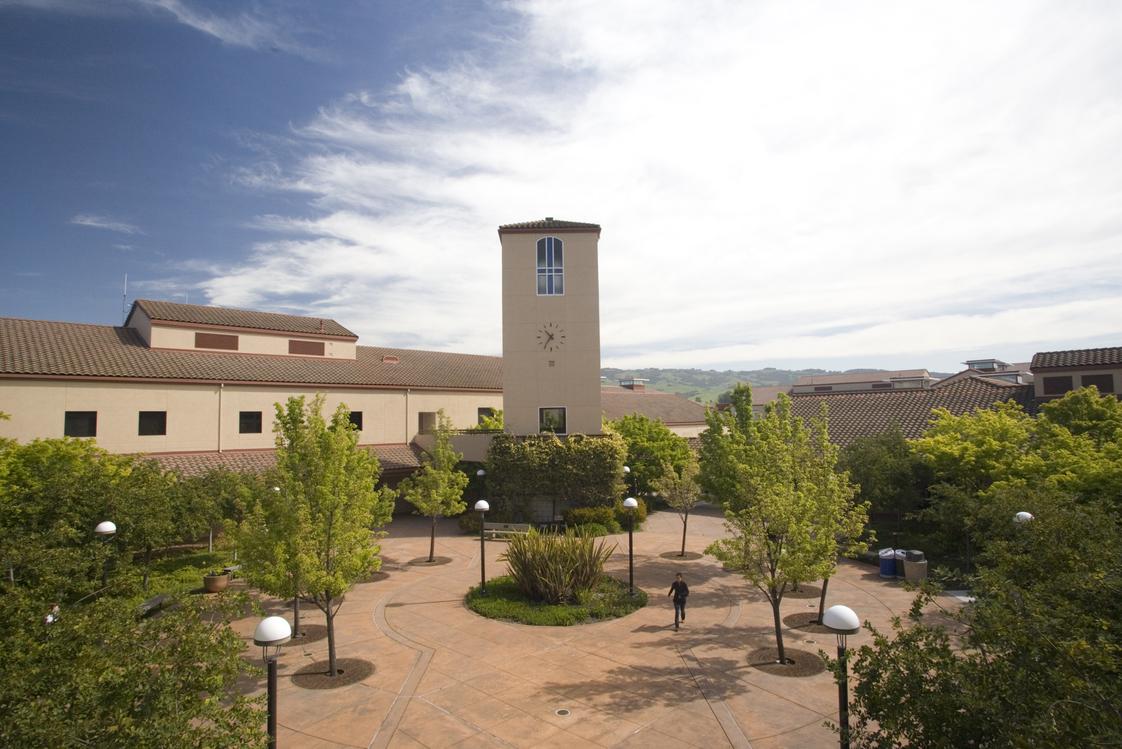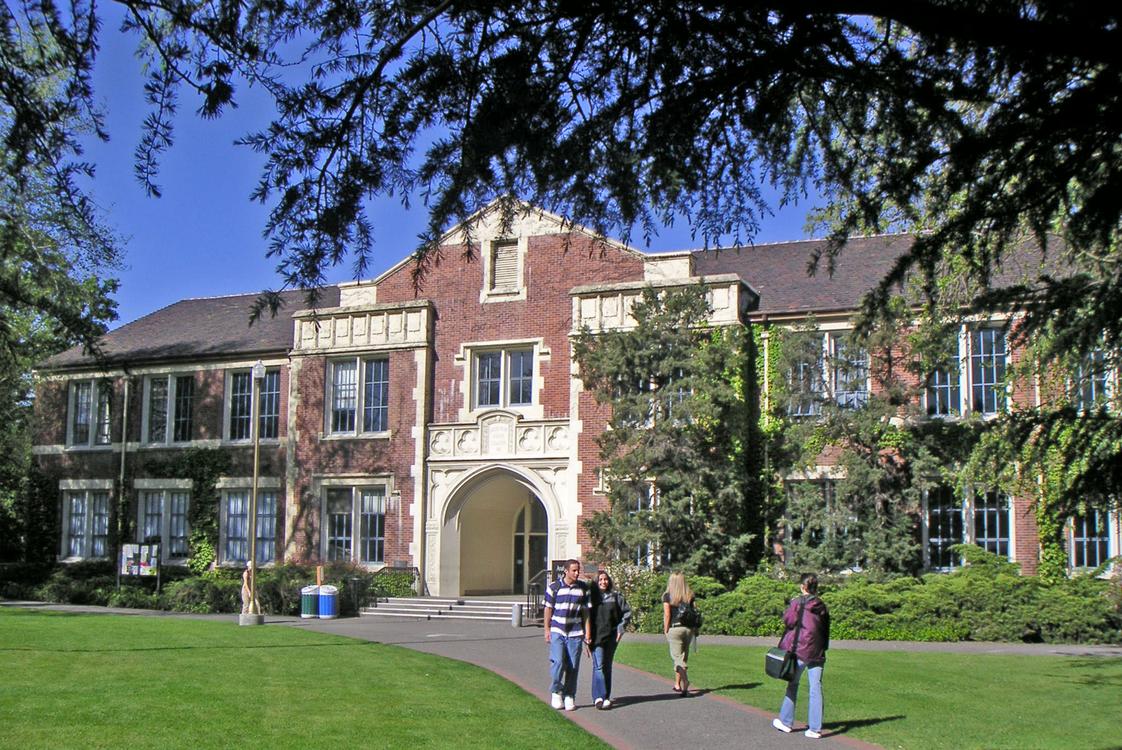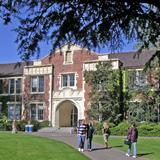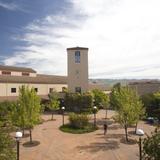- Santa Rosa Junior College is one of California's leading community colleges and has a 100-year history of excellence in education. Award-winning faculty teach university transfer courses, degree and certificate programs, career education, and a wide variety of classes to students ranging from high school age to active older adults
School Highlights
Santa Rosa Junior College serves 23,299 students (21% of students are full-time).
The college's student:teacher ratio of 22:1 is lower than the state community college average of 32:1.
Minority enrollment is 58% of the student body (majority Hispanic), which is less than the state average of 77%.
Quick Stats (2025)
- Enrollment: 23,299 students
- In-state tuition: $1,340
- Out-state tuition: $7,388
- Acceptance Rate: 100%
- Student:teacher ratio: 22:1
- Minority enrollment: 58%
- Source: Verified school update
Top Rankings
Santa Rosa Junior College ranks among the top 20% of public schools in California for:
Category
Attribute
Community Size
School Overview
The teacher population of 1,077 teachers has stayed relatively flat over five years.
Santa Rosa Junior College
(CA) Community College Avg.
Carnegie Classification
Associate's Colleges: High Transfer-Mixed Traditional/Nontraditional
Baccalaureate/Associate's Colleges: Associate's Dominant
Institution Level
At least 2 but less than 4 years
At least 2 but less than 4 years
Institution Control
Public
Public
Total Faculty
1,077 staff
294 staff
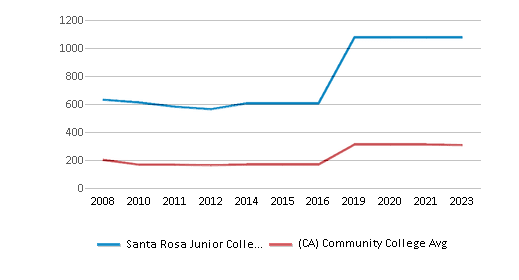
School Calendar
Student Body
The student population of Santa Rosa Junior College has grown by 21% over five years.
The student:teacher ratio of 22:1 has increased from 16:1 over five years.
The Santa Rosa Junior College diversity score of 0.67 is less than the state average of 0.70. The school's diversity has stayed relatively flat over five years.
Total Enrollment
23,299 students
2,311 students
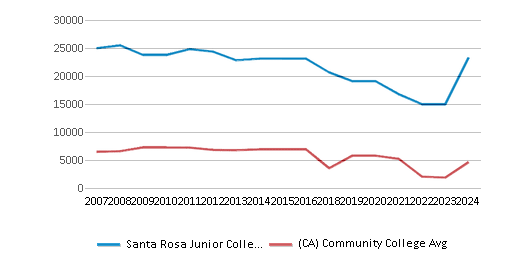
Student : Teacher Ratio
22:1
32:1
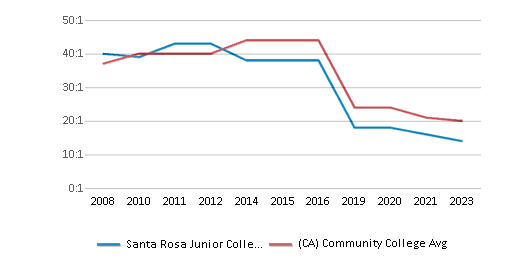
# Full-Time Students
4,904 students
1,232 students
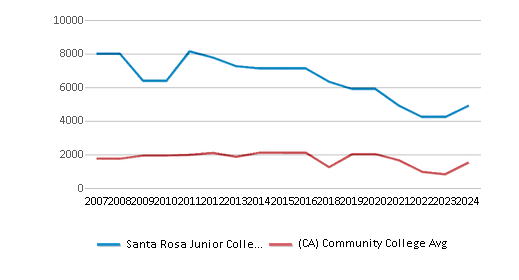
# Part-Time Students
18,395 students
8,299 students
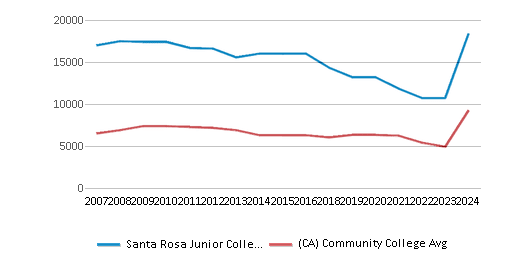
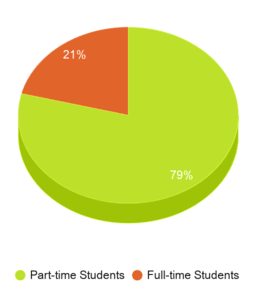
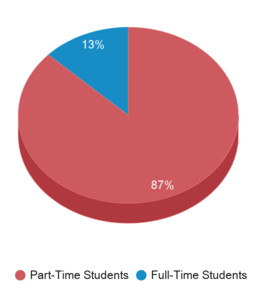
# Enrollment Undergraduate
232 students
240 students
# Full-Time Undergraduate Students
4,904 students
1,155 students
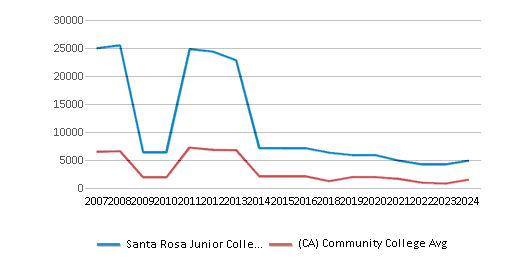
# Full-Time Graduate Students
n/a
63 students
# Part-Time Undergraduate Students
18,395 students
8,457 students
# Part-Time Graduate Students
n/a
10 students
Total Dormitory Capacity
n/a
140 students
% American Indian/Alaskan
1%
n/a
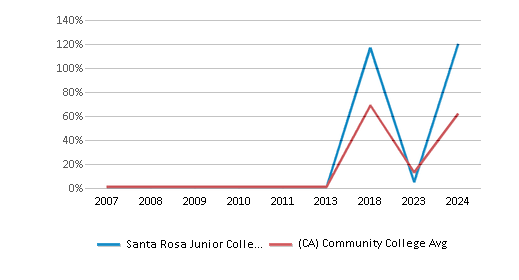
% Asian
4%
13%
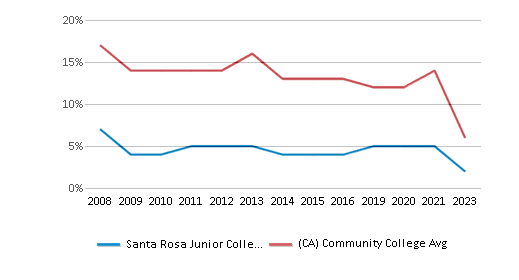
% Hispanic
39%
47%
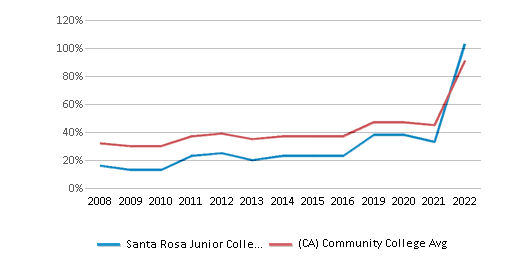
% Black
2%
7%
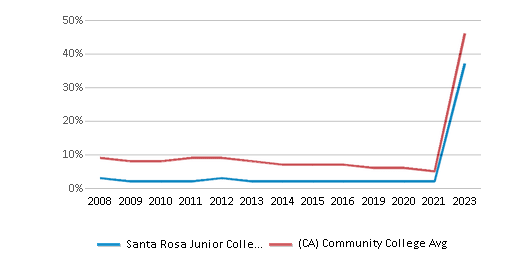
% White
42%
23%
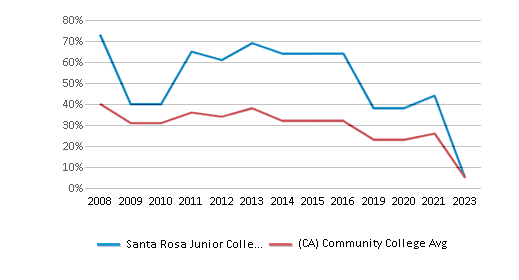
% Hawaiian
n/a
1%
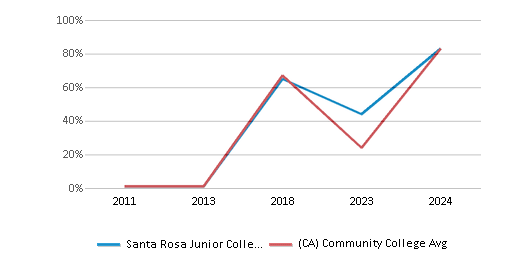
% Two or more races
5%
5%
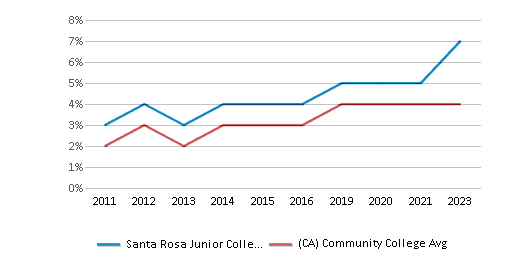
% Non Resident races
n/a
1%
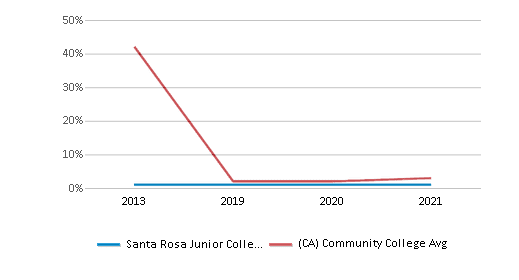
% Unknown races
5%
3%
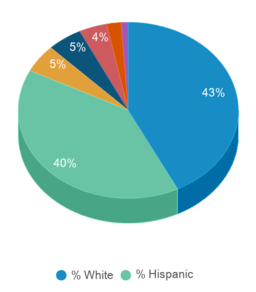
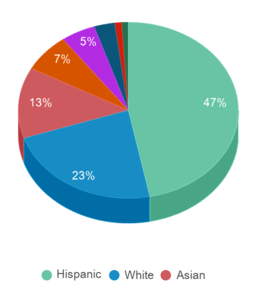
Diversity Score
0.67
0.70
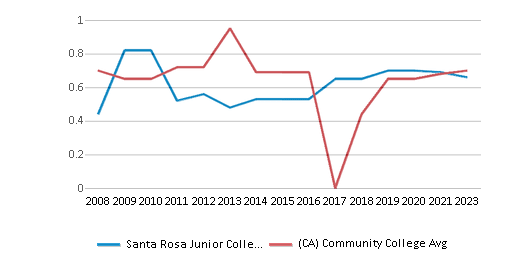
College Completion Rate (Students who graduate in less than 4 years)
0.307%
0.4221%
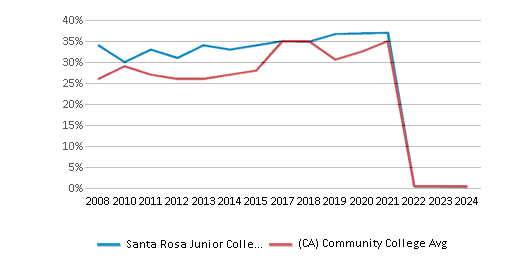
College Completion Rate (Students who graduate in 4 years or more than 4 years)
n/a
0.4304%
Average Graduate Earnings (10 Years)
$41,300
$34,700
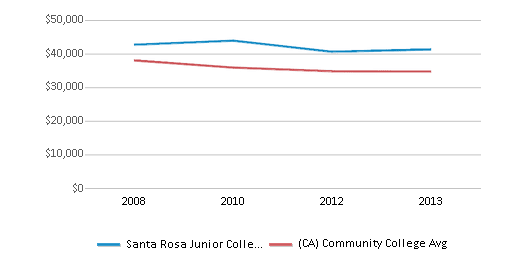
Tuition and Acceptance Rate
The public in-state tuition of $1,340 is more than the state average of $1,236. The in-state tuition has stayed relatively flat over four years.
The public out-state tuition of $7,388 is more than the state average of $6,547. The out-state tuition has declined by 9% over four years.
In-State Tuition Fees
$1,340
$1,236
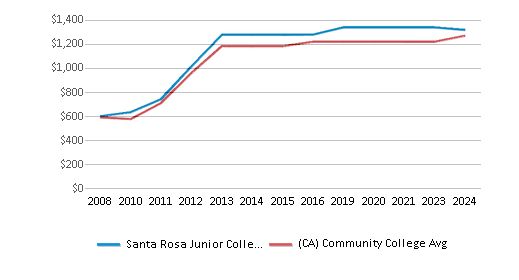
Out-State Tuition Fees
$7,388
$6,547
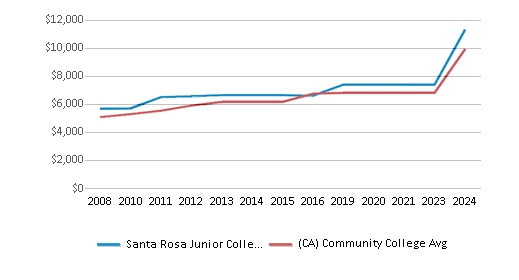
Tuition Notes
$46 per-unit enrollment fee
% Students Receiving Some Financial Aid
79%
85%
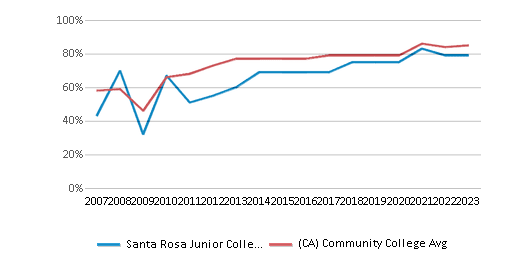
Median Debt for Graduates
$9,951
$10,500
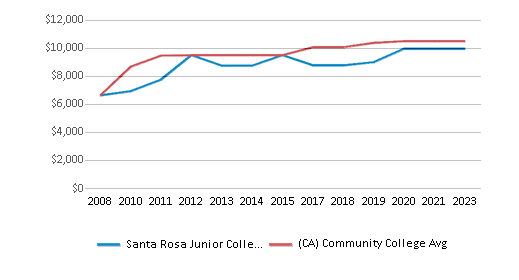
Median Debt for Dropouts
$6,750
$6,239
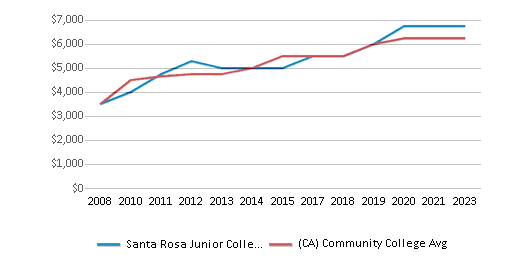
Acceptance Rate
100%
92%
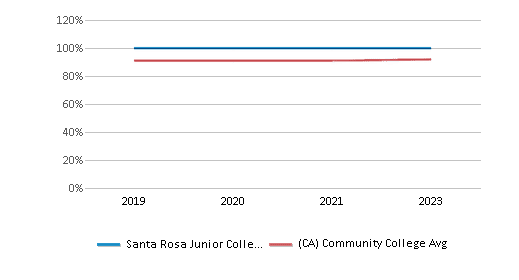
Sports
Total Sports Offered
17 sports
Sports
Ballet, Baseball, Basketball, Cheering, Cross Country, Dance, Diving, Fencing, Football, Golf, Soccer, Swimming, Tennis, Track and Field, Volleyball, Water Polo, Wrestling
Extracurriculars
Total ExtracurricularsTotal Extra-curric.
59 extracurriculars
ExtracurricularsExtra-curric.
Club or Organization:
A Place for Parents, APASS, ASL Club, Bear Cub Bike Club, Biology Club, Black & Brown Union, Black Student Union, Business & Career Networking Club, Capoeira Club, Circle K International, Community for Change, Computer Science Club, Culinary Cubs, Data Science Club, EcoLeaders Club, Economics Club, English Club, Fencing Club, Fire Technology and Emergency Medical Service Club, Gender and Sexuality Alliance, Geology Club, Grow and Prosper Club, International Club, Intervarsity Christian Fellowship, Marketing Club, Math Club, Movimento Estudiantil Chicano de Aztlan (MEChA), Mujeres Xingonas, Native American Student Council, Nutrition Club, Petaluma Anime Club, Petaluma Bridges LGBQT+ Club, Petaluma Chapter of the National Society of Leadership & Success (Sigma Alpha Pi), Petaluma Communications Club, Petaluma Communications Honor Society (Sigma Chi Eta), Petaluma Computer Security Club, Petaluma Dreamers Club, Petaluma E-Gaming Club, Petaluma Females Empowering Each Other, Petaluma Games Club, Petaluma Gateway to College, Petaluma Makers Club, Petaluma Multicultural Dancing Club, Petaluma Our House Club, Petaluma Puente Club, Petaluma Story Club, Phi Theta Kappa, Puente Club, Second Chance Club, Society of Physics Students, SRJC Cheerleading, SRJC Men's Rugby, SRJC Polar Bears Ice Hockey, Student Ambassadors, Students for Recovery, The Engineering Club, The Real Geek Squad Club, UNICEF Club, Young Americans for Liberty Club
A Place for Parents, APASS, ASL Club, Bear Cub Bike Club, Biology Club, Black & Brown Union, Black Student Union, Business & Career Networking Club, Capoeira Club, Circle K International, Community for Change, Computer Science Club, Culinary Cubs, Data Science Club, EcoLeaders Club, Economics Club, English Club, Fencing Club, Fire Technology and Emergency Medical Service Club, Gender and Sexuality Alliance, Geology Club, Grow and Prosper Club, International Club, Intervarsity Christian Fellowship, Marketing Club, Math Club, Movimento Estudiantil Chicano de Aztlan (MEChA), Mujeres Xingonas, Native American Student Council, Nutrition Club, Petaluma Anime Club, Petaluma Bridges LGBQT+ Club, Petaluma Chapter of the National Society of Leadership & Success (Sigma Alpha Pi), Petaluma Communications Club, Petaluma Communications Honor Society (Sigma Chi Eta), Petaluma Computer Security Club, Petaluma Dreamers Club, Petaluma E-Gaming Club, Petaluma Females Empowering Each Other, Petaluma Games Club, Petaluma Gateway to College, Petaluma Makers Club, Petaluma Multicultural Dancing Club, Petaluma Our House Club, Petaluma Puente Club, Petaluma Story Club, Phi Theta Kappa, Puente Club, Second Chance Club, Society of Physics Students, SRJC Cheerleading, SRJC Men's Rugby, SRJC Polar Bears Ice Hockey, Student Ambassadors, Students for Recovery, The Engineering Club, The Real Geek Squad Club, UNICEF Club, Young Americans for Liberty Club
Source: 2024 (or latest year available) Integrated Postsecondary Education Data System (IPEDS) , School Administrators
School Notes
- Santa Rosa Junior College, founded in 1918, is the tenth oldest of California's 108 publicly funded, two-year community colleges. From its initial freshman class of 19 students in 1918, SRJC has grown into one of the largest single college districts in the country: the Sonoma County Junior College District. SRJC offers a strong general education program for students planning to transfer to four-year colleges and universities, as well as more than 140 occupational programs designed to prepare students for the workforce. The college grants both associate of arts (A.A.) and associate of sciences (A.S.) degrees. SRJC offers comprehensive transfer preparatory and career training programs at dozens of sites, including two beautiful campuses in Petaluma and Santa Rosa that are located 35 and 52 miles north of San Francisco, respectively. Both the oak-studded Santa Rosa Campus, which is largely characterized by elegant turn-of-the-century brick buildings on over 100 acres, and the 40-acre contemporary adobe style Petaluma Campus, offer a distinct and welcoming atmosphere that is highly conducive to student learning and to employment. The college operates a self-sustaining 365-acre Shone Farm near the Russian River, a progressive Technology Academy in Telecom Valley, a new student run gourmet Culinary Arts Center in downtown Santa Rosa, and a top flight Public Safety Center Training Center in Windsor. SRJC has international education programs in Europe and Central America, conference winning athletic programs, nationally ranked speech and debate teams, a national recognized Summer Repertory Theatre, Planetarium, the Jesse Peter Native American Museum, and Art Gallery. At SRJC we focus on the student, and the successes that our students have achieved are evidence of that attention. While we traditionally enroll approximately 36,000 students each semester, our class sizes are small and students have the opportunity to work closely with their instructors. Our transfer students who go on to four-year colleges and universities do as well as (and in many cases, better than) students who began their college careers at a four-year institution. Students who complete one of more than 150 vocational certificates enter the workforce well trained to succeed in business and industry.
Frequently Asked Questions
How much does Santa Rosa Junior College cost?
Santa Rosa Junior College's tuition is approximately $1,340 for In-State students and $7,388 for Out-State students.
What is the acceptance rate of Santa Rosa Junior College?
The acceptance rate of Santa Rosa Junior College is 100%, which is higher than the state average of 92%.
What sports does Santa Rosa Junior College offer?
Santa Rosa Junior College offers 17 interscholastic sports: Ballet, Baseball, Basketball, Cheering, Cross Country, Dance, Diving, Fencing, Football, Golf, Soccer, Swimming, Tennis, Track and Field, Volleyball, Water Polo and Wrestling.
What is Santa Rosa Junior College's ranking?
Santa Rosa Junior College ranks among the top 20% of community college in California for: Largest student body.
In what neighborhood is Santa Rosa Junior College located?
Santa Rosa Junior College is located in the West Junior College neighborhood of Santa Rosa, CA.
Recent Articles

Obtaining Your Bachelor's Degree at a Community College
Explore the evolving landscape of community colleges offering bachelor's degrees, addressing affordability, accessibility, and workforce needs.

A to Z of Community College Certificates and Courses
From business and healthcare to technology and skilled trades, the article showcases the breadth of options available to students seeking to enhance their knowledge, develop new skills, or pursue career advancement.

What is a Community College?
This comprehensive guide explains what a community college is, its history, and its role in higher education. It covers the types of programs offered, differences from four-year colleges, benefits of attending, and important considerations for prospective students, providing valuable insights for those exploring educational options.

